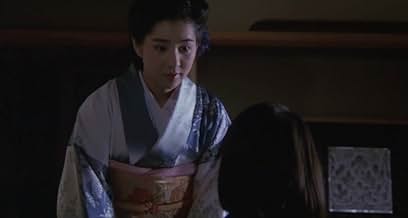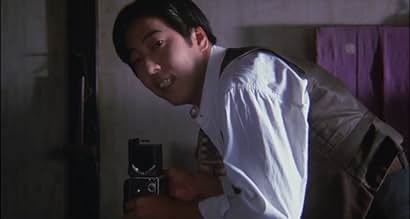AVALIAÇÃO DA IMDb
7,2/10
1,8 mil
SUA AVALIAÇÃO
Adicionar um enredo no seu idiomaThe orphaned Makioka sisters look for a husband for their third sister, Yukiko, as the rebellious youngest sister, Taeko, is kept waiting her turn.The orphaned Makioka sisters look for a husband for their third sister, Yukiko, as the rebellious youngest sister, Taeko, is kept waiting her turn.The orphaned Makioka sisters look for a husband for their third sister, Yukiko, as the rebellious youngest sister, Taeko, is kept waiting her turn.
- Direção
- Roteiristas
- Artistas
- Prêmios
- 5 vitórias e 9 indicações no total
Yonedanji Katsura
- Okuhata
- (as Kobeichô Katsura)
Michino Yokoyama
- Itani
- (as Michiyo Yokoyama)
Avaliações em destaque
I give this film 10 out of 10 as even after seeing it more than 10 times it still moves me deeply. I was 15 years old when I first saw this movie in the theater in Seattle. I went back to see it again a couple of weeks later. The first 13 minutes during the credits is my favorite scene, filmed in Kyoto in Springtime. Read the book for more background. The Kimono worn by the female actresses are amazing. The late Juzo Itami plays the father. All the dialog is spoken in "Osaka-ben" or Osaka dialect, which has a softer sound than Tokyo dialect. You can also hear some Kyoto-ben too ("gomen-yasu" said by a servant upon entering in the first scene before entering the room). This film brings me to tears it is so beautiful. At the end of the first scene, when the camera pans out to the cherry blossoms outside and the music starts...it is cinematic heaven! I am waiting for this film to come out on DVD.
Kon Ichikawa probably is the director who most rightfully can be considered to be the successor of Yasujiro Ozu. At the beginning of his career he made a couple of war films, but later his subject was more and more the daily life of middle class families.
"The Makioka sisters" is a film from the second half of his career and is about the relationships between four sisters of a family in the Kimono business. All the sisters are different. The two oldest are married, number 3 and 4 are still single. The oldest one runs the external (business) relations, the second one runs the internal (family) relations. Number 3 is looking for a husband the traditional way and is choosy in this regard. Number 4, who can (according to tradition) only marry when number 3 is finally married, is more easy going. She finds the character of her potential boy friends more important than his social standing.
"The Makioka sisters" was a film in honor of the 50th anniversary of the production company, so the film had to be a little festive. Situating the film in a family in the kimono business enabled Ichikawa to use bright colors, and in this respect the film reminded me of "Ju Dou" (1990, Zhang Yimou).
Due to the possibility of using bright colors in a film and not in a book, one is inclined to say that in this case the film must be better than the book. Some years ago I read (another) book from the writer Jun'ichiro Tanizaki and now I am not so sure anymore. Tanizaki turned out to be a very subtle writer. Maybe I need to read "The Makioka sisters" some day to come to a final judgement.
"The Makioka sisters" is a film from the second half of his career and is about the relationships between four sisters of a family in the Kimono business. All the sisters are different. The two oldest are married, number 3 and 4 are still single. The oldest one runs the external (business) relations, the second one runs the internal (family) relations. Number 3 is looking for a husband the traditional way and is choosy in this regard. Number 4, who can (according to tradition) only marry when number 3 is finally married, is more easy going. She finds the character of her potential boy friends more important than his social standing.
"The Makioka sisters" was a film in honor of the 50th anniversary of the production company, so the film had to be a little festive. Situating the film in a family in the kimono business enabled Ichikawa to use bright colors, and in this respect the film reminded me of "Ju Dou" (1990, Zhang Yimou).
Due to the possibility of using bright colors in a film and not in a book, one is inclined to say that in this case the film must be better than the book. Some years ago I read (another) book from the writer Jun'ichiro Tanizaki and now I am not so sure anymore. Tanizaki turned out to be a very subtle writer. Maybe I need to read "The Makioka sisters" some day to come to a final judgement.
The Makioka Sisters isn't really my kind of film, owing to it mostly being about matchmaking and set some decades ago (at least on the surface; there's a little more to chew on beyond the premise). That being said, I found enough to like here.
As the title might imply, the sisters really take charge here, and it was refreshing to watch a film like this set as far back as the late 1930s (to my knowledge, a very culturally conservative time in Japan's history) have female characters with agency who took charge. Mainly, it's the two older sisters of the four looking over the two younger sisters, given they've all been orphaned, with the two older siblings sometimes butting heads while doing what's right for the younger ones. They all feel like they have something of a say over where they're going in life (I guess the older siblings more so than the younger ones, but still), and that was good to see, and I imagine inspiring.
The acting is all solid. Male characters are put in the background, but aren't just there to be mocked or ridiculed. It feels like a feminist movie in a slightly more relaxed way than this premise might be done today, and I think I respect it for that. It's all nice and real and genuine, and doesn't call attention or show off regarding how much agency it's giving its female characters; it's not just doing it to get applause or grandstand.
The film also looks nice, which I think can be said about anything Kon Ichikawa directed. Unfortunately, it is a little long, at 140 minutes. Maybe about 110 minutes would've felt like the sweet spot for me, but trying runtime aside (it's a little boring in parts), I did mostly like The Makioka Sisters.
As the title might imply, the sisters really take charge here, and it was refreshing to watch a film like this set as far back as the late 1930s (to my knowledge, a very culturally conservative time in Japan's history) have female characters with agency who took charge. Mainly, it's the two older sisters of the four looking over the two younger sisters, given they've all been orphaned, with the two older siblings sometimes butting heads while doing what's right for the younger ones. They all feel like they have something of a say over where they're going in life (I guess the older siblings more so than the younger ones, but still), and that was good to see, and I imagine inspiring.
The acting is all solid. Male characters are put in the background, but aren't just there to be mocked or ridiculed. It feels like a feminist movie in a slightly more relaxed way than this premise might be done today, and I think I respect it for that. It's all nice and real and genuine, and doesn't call attention or show off regarding how much agency it's giving its female characters; it's not just doing it to get applause or grandstand.
The film also looks nice, which I think can be said about anything Kon Ichikawa directed. Unfortunately, it is a little long, at 140 minutes. Maybe about 110 minutes would've felt like the sweet spot for me, but trying runtime aside (it's a little boring in parts), I did mostly like The Makioka Sisters.
Not being in the mood for a Japanese take on "Masterpiece Theatre" I bailed about halfway through this Kon Icikawa offering. I notice several prior reviewers have compared this film to the works of Ozu. And while it is true that "Sisters" is a family drama, a genre Ozu all but invented in his country, it could not be more different in mood and feel. Where works such as "Late Spring" and "Tokyo Story" are contemplative, sad and often quite funny I found this film to be melodramatic, stiff and occasionally amusing. Perhaps the biggest difference between the two directors is in the pacing. Where Ozu's best films flow, slowly but inexorably, toward a powerful conclusion I found Ichikawa's pacing to be, well, let's use the "Masterpiece" analogy again. Too many indoor scenes that felt like skilled, dramatic readings from Tanizaki's great novel rather than a visual adaptation of it. Which is not to say the film isn't beautiful to look at. Indeed, it is gorgeous, with resplendant costumes and art direction that marvelously recreate Japan on the eve of Disaster (otherwise known as WW2). In fact, it is the look of the film that kept me from bailing sooner. C plus.
One should first read The Makioka Sisters by Junichiro Tanizaki to better understand this film. It is a very great novel about the life of four middle-class sisters in Osaka, Japan in the 1930's. The book describes in great detail the many subtleties of life in Japan which a Westerner can miss understanding in the film. The film rather closely follows the book and is very beautifully photographed.
Você sabia?
- CuriosidadesThe story spans the period from autumn, 1936, to April, 1941, ending about seven months before the Japanese attack on Pearl Harbor. The novel references a number of contemporary events, such as the Kobe flood of 1938, the Second Sino-Japanese War, and the growing tensions in Europe.
- Erros de gravaçãoTaeko is clearly wearing a strapless bra when she's in the bathtub.
- ConexõesReferenced in Todo Dia é um Bom Dia (2018)
Principais escolhas
Faça login para avaliar e ver a lista de recomendações personalizadas
- How long is The Makioka Sisters?Fornecido pela Alexa
Detalhes
Contribua para esta página
Sugerir uma alteração ou adicionar conteúdo ausente

























